Past Events
Interested in Cotsen events? Sign up for our mailing list.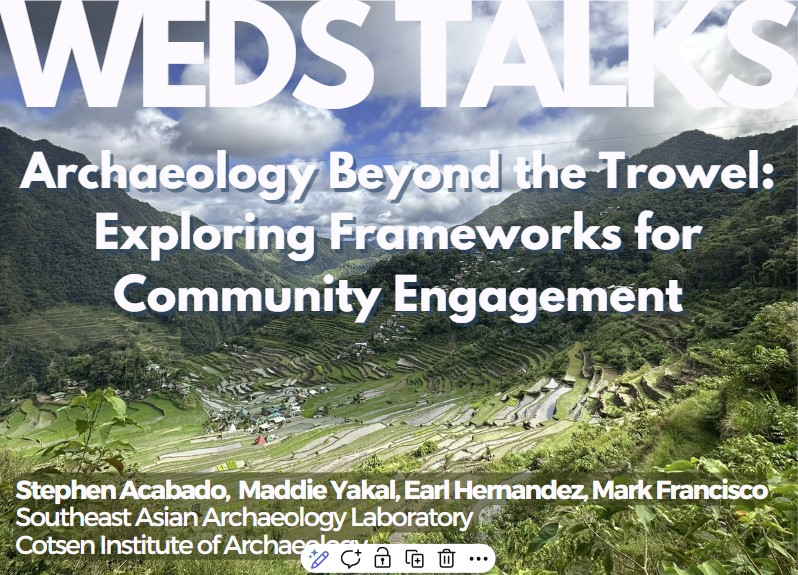
ABSTRACT: This panel presents the SEAALAB framework Archaeology Beyond the Trowel, which positions community engagement as a core practice and protocol in archaeology. Moving beyond research design, the approach insists on meaningful consultation, shared authorship, and transparency as foundational to ethical research. We confront questions archaeologists must grapple with: Who defines what counts as knowledge? Whose interpretations matter? What does consent look like beyond paperwork? The presentation reflects on the discipline’s entanglements with colonialism and extraction, and how these legacies continue to shape field practices and assumptions of authority. By foregrounding community priorities and co-developing research goals, SEAALAB challenges the notion that archaeologists are neutral stewards of the past. Instead, we offer a model for collaborative scholarship grounded in accountability, reciprocity, and respect for living communities whose histories are at stake. This framework is relevant not only for archaeology, but for any field-based discipline working with people and places.
BIO: The Southeast Asian Archaeology Laboratory (SEAALAB) at UCLA focuses on community-engaged research in the Philippines and broader Southeast Asia. The lab investigates culture contact, colonialism, and Indigenous responses through collaborative fieldwork. SEAALAB emphasizes ethical practice, local partnerships, and the integration of Indigenous knowledge in archaeological interpretation. Panelists: Maddie Yakal, Earl Hernandez, Mark Francisco, and Stephen Acabado
Contact Sumiji Takahashi
Email sutakahashi@ioa.ucla.edu
Phone 310-825-4169
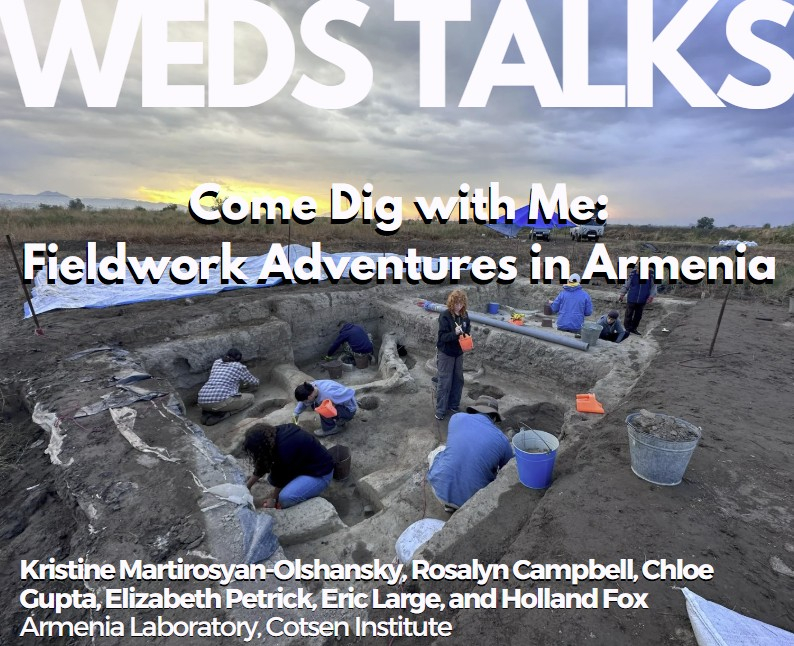
ABSTRACT: This talk explores the fieldwork experiences of undergraduate students participating in the Masis Blur Neolithic Archaeological Project in Armenia. As one of the region's earliest known farming settlements, Masis Blur offers a rich context for hands-on learning in archaeological excavation, analysis, and cultural heritage preservation. The presentation highlights student involvement in daily field operations, laboratory work, and engagement with the local and culture. Through firsthand accounts the talk underscores the value of experiential learning in shaping future archaeologists. But put simply, come, learn what we did last summer!
BIO: Kristine Martirosyan-Olshansky is an assistant researcher at the Cotsen where she directs the Armenia Laboratory, and she has been the co-directing the Masis Blur Archaeological Project since 2012. Rosalyn Campbell is a bioarchaeologist and Egyptologist who has excavated through the Middle East, Africa, as well as Peru and North America. Chloe Gupta, Elizabeth Petrick, Eric Large, and Holland Fox are undergraduate students at UCLA. Chloe, Elizabeth, and Eric are also the founding members of the “risen from the ashes” Undergraduate Archaeology Club.
Contact Sumiji Takahashi
Email sutakahashi@ioa.ucla.edu
Phone 310-825-4169
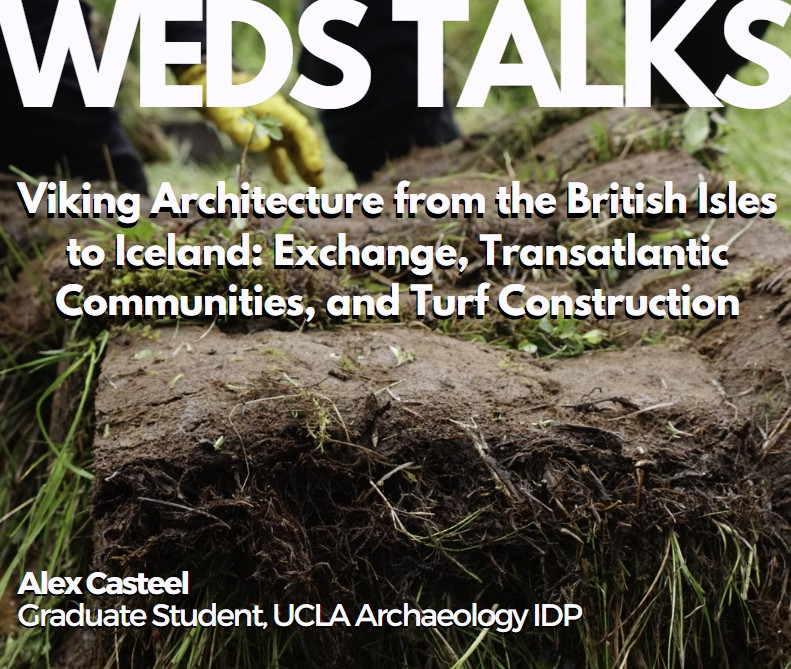
ABSTRACT: This talk, a work in progress, questions the logic that continues to marginalize Vikings within the fields of art and architectural history. This paper instead explores the possibility and subsequent implications of artistic and architectural exchange across the Viking diaspora. It does so primarily by examining the functional commonalities of a wall construction technique in use in the British Isles and after circa 865, in Iceland, across respective mediums of stone and turf.
BIO: Alex is a 3rd-year PhD student in the Cotsen Institute of Archaeology. His ongoing research is a product of collaboration, and he has received especially generous support for his fieldwork from the Leifur Eiríksson Foundation.
Contact Sumiji Takahashi
Email sutakahashi@ioa.ucla.edu
Phone 310-825-4169
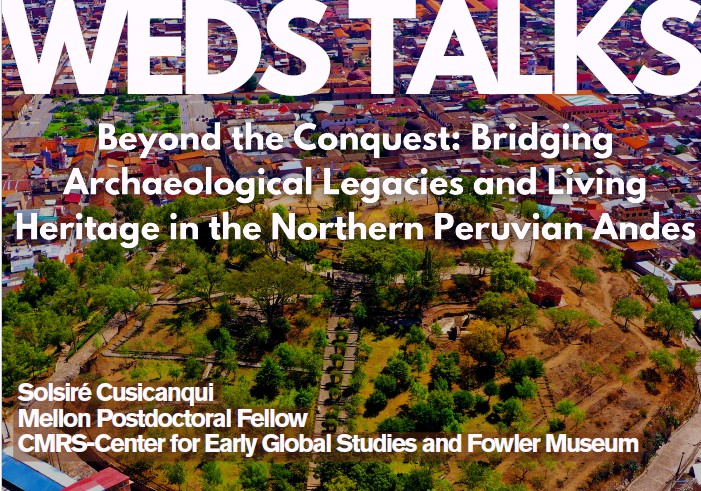
ABSTRACT: This presentation shares the results of an ongoing, long-term, community-based project in the historic city of Cajamarca, globally known as the site of the encounter, capture, and eventual execution of the Sapa Inca Atahualpa by conquistador Francisco Pizarro. My work focuses on two meaningful sites: Cerro Santa Apolonia, the sacred hill at the heart of the city, which holds over 2,000 years of human history, and the area around the only surviving Inca structure in Cajamarca—the so-called Ransom Room. Excavated for the first time, this space is helping us rethink what the city looked like before and during the conquest. Rooted in local voices and lived memory, the project seeks to challenge colonial narratives and reconnect Cajamarca’s people with their past. Through open excavations, school visits, and shared conversations, archaeology becomes a bridge—linking material remains with identity, memory, and pride. This effort, built through trust and collaboration with local authorities, universities, and private partners, reveals a powerful truth: the past is still alive, and it belongs to the community.
BIO: Solsiré Cusicanqui is a postdoctoral fellow at UCLA since 2024, affiliated with the Center for Early Global Studies and the Fowler Museum as part of the project “Race in the Global Past through Native Lenses.” She is a Peruvian archaeologist with over 20 years of experience leading archaeological and heritage projects across Peru. She earned her Ph.D. from Harvard University and taught as a College Fellow. Her current research focuses on memory, mobility, and territorial transformation during the Spanish conquest, centered in Cajamarca. She directs two urban excavation projects combining archaeology, education, and community-based heritage work. Her interdisciplinary, decolonial approach centers Indigenous perspectives to foster more inclusive narratives of the past.
Contact Sumiji Takahashi
Email sutakahashi@ioa.ucla.edu
Phone 310-825-4169
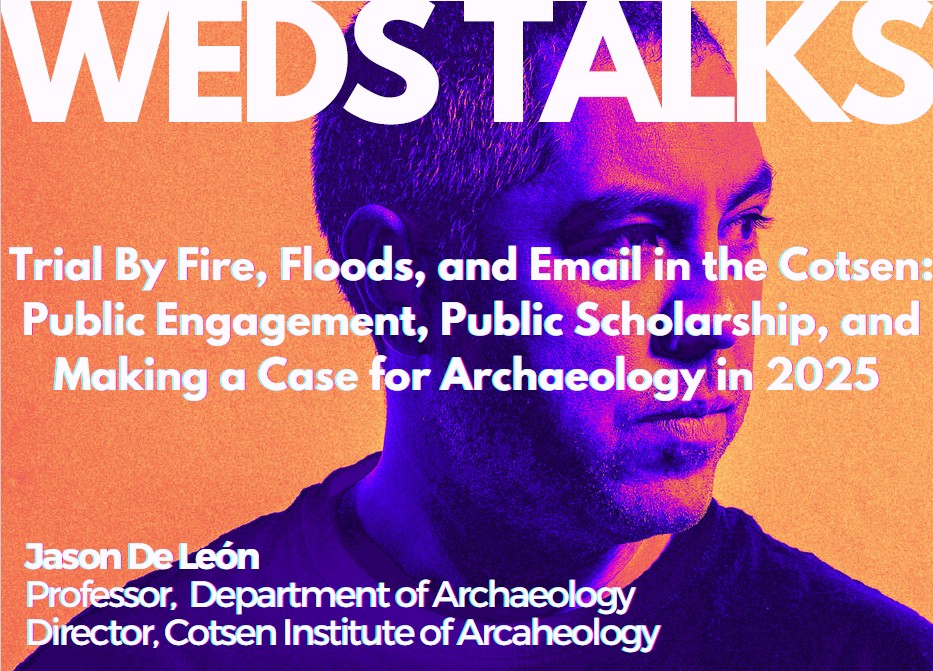
ABSTRACT: I became director of the Cotsen Institute of Archaeology in November of 2023. Since that time, many dramatic things have happened locally, nationally, and globally that have directly impacted our Cotsen community, the discipline of archaeology, and our world at large. During this tumultuous period, I have been engaged in a wide variety of projects related to student research and support, community outreach, and connecting archaeology to contemporary social issues. In addition, I have been actively promoting a book and developing several new projects related to archaeology, migration, displacement, and climate change. In this talk I highlight some of my recent activities as both Director of the Cotsen and the Undocumented Migration Project, a research-arts-education collective aimed at
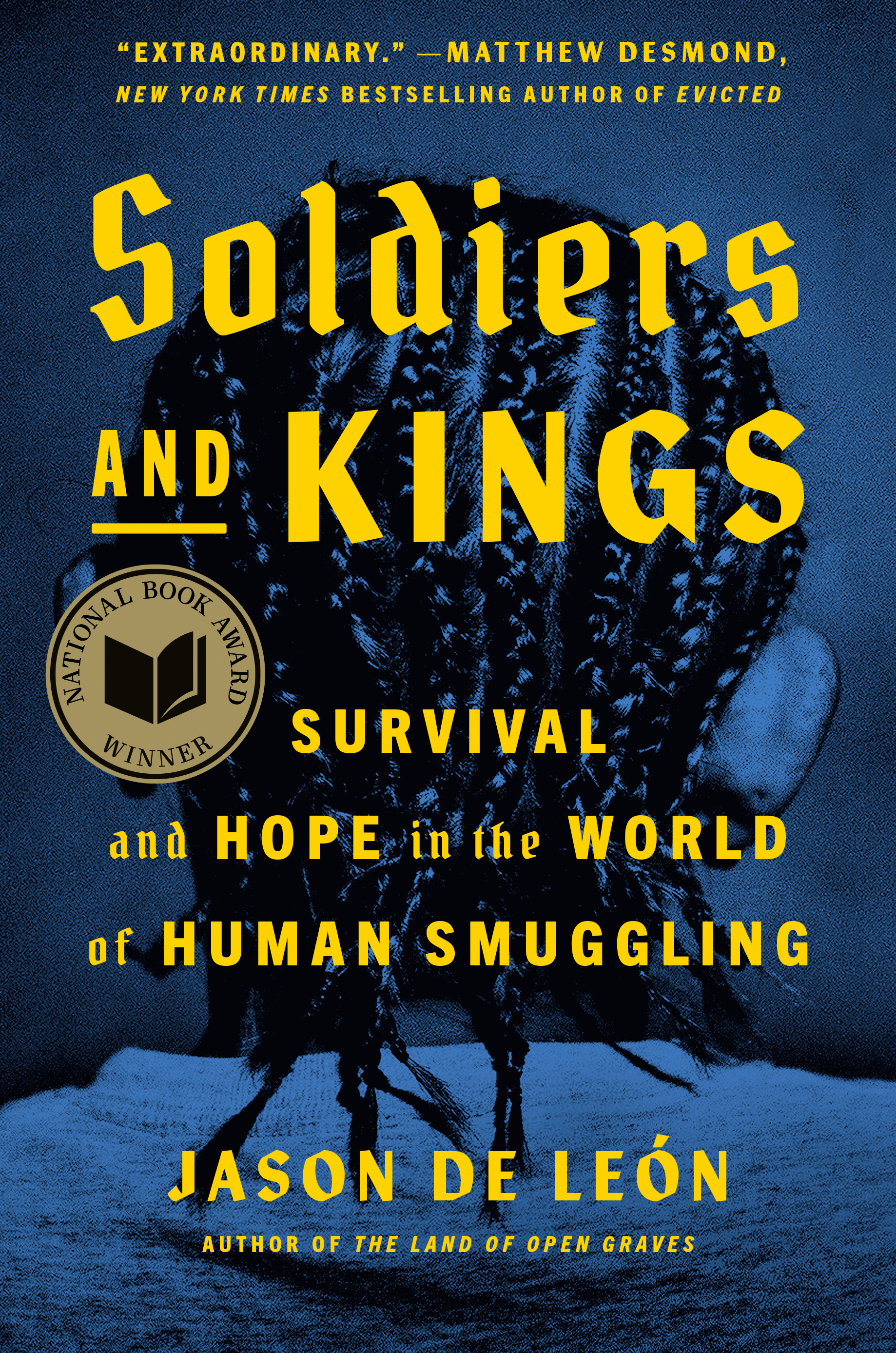 raising awareness about migration issues globally. I also discuss the importance of public facing social science research, the wonderfulness of education outreach, and the crucial role that archaeology can play in helping us understand our current political-environmental moment.
raising awareness about migration issues globally. I also discuss the importance of public facing social science research, the wonderfulness of education outreach, and the crucial role that archaeology can play in helping us understand our current political-environmental moment.
BIO: Jason De León is Lloyd E. Cotsen Endowed Chair of Archaeology, Professor of Anthropology and Chicana/o Studies, and Director of the Cotsen Institute of Archaeology at the University of California, Los Angeles. He is also Executive Director of the Undocumented Migration Project, a non-profit research, arts, and education collective that seeks to raise awareness about migration issues globally. He is a 2017 MacArthur Foundation Fellow and author of the award-winning book "The Land of Open Graves: Living and Dying on the Migrant Trail." De Leon's latest book “Soldiers and Kings: Survival and Hope in the World of Human Smuggling” won the 2024 National Book Award for Nonfiction.
Contact Sumiji Takahashi
Email sutakahashi@ioa.ucla.edu
Phone 310-825-4169
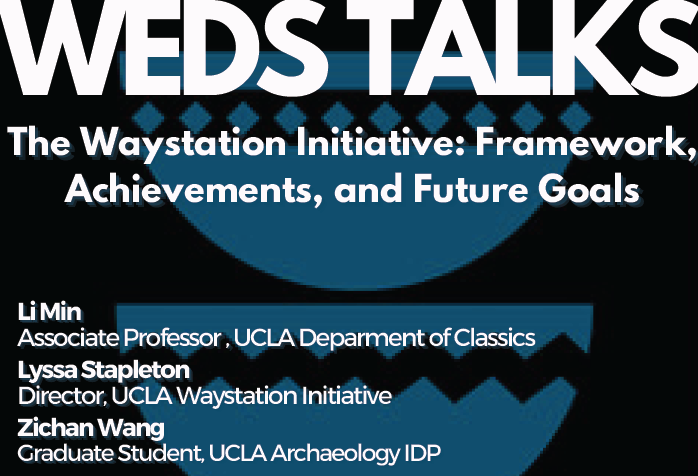
ABSTRACT: The Waystation Initiative, officially launched in the winter of 2023, aims to advance approaches to the stewardship of cultural heritage through interdisciplinary research and international collaboration. This presentation will examine the Initiative’s origins, objectives, achievements, and future directions. Professor Li Min will discuss the conceptual foundation and early development of the initiative, while Dr. Lyssa Stapleton will outline its structural framework, current goals, and long-term vision. Zichan Wang will provide insights into her role as the Waystation Graduate Student Researcher, her experiences as a certificate program student, and her work as the primary liaison with China’s National Cultural Heritage Administration. Together, their discussion will highlight the Initiative’s impact and its evolving role in preserving and restituting global cultural heritage.
BIOS: Li Min holds a Ph.D. in Archaeological Anthropology from the University of Michigan and is currently an Associate Professor of East Asian Archaeology in the Department of Anthropology and the Department of Asian Languages and Cultures at the University of California, Los Angeles. His primary research focuses on archaeology of prehistoric and the Bronze Age China, with particular interests in state formation, ritual performance, sacred landscape, and Bronze Age Eurasian interactions. His research also involves history of archaeological thought, the archaeology of early modern global trade, and the conservation of cultural heritage.
Lyssa C. Stapleton holds an MA and PhD in Archaeology from UCLA. In January 2023, she joined the UCLA Cotsen Institute of Archaeology as the Director of the Waystation Initiative and Administrator of the Graduate Certificate Program in Cultural Heritage Research, Stewardship, and Restitution. Dr. Stapleton’s research interests center on the evolution of institutional and private collections in the 20th and 21stcentury, with a particular focus on decolonization, stewardship, collaborative curation, and voluntary returns.
Zichan is a PhD candidate at the Cotsen Institute. She is an archaeologist studying social transformation in Neolithic and Early Bronze Age China. She has worked with the Waystation Initiative since 2023 as a GSR and as the liaison with Waystation's partners in China.
Contact Sumiji Takahashi
Email sutakahashi@ioa.ucla.edu
Phone 310-825-4169
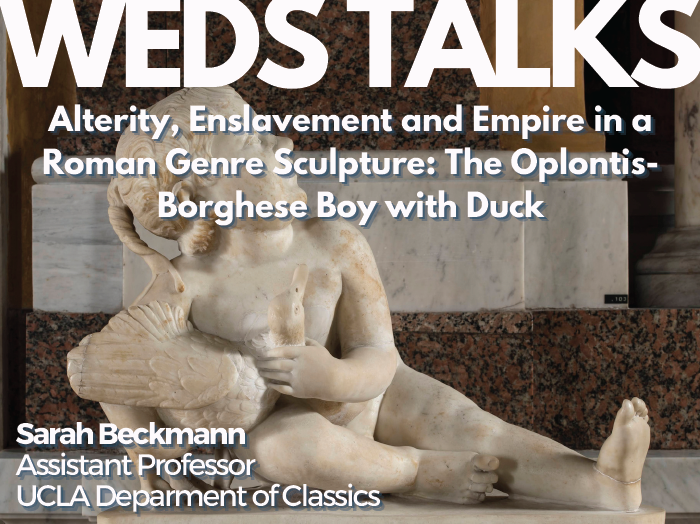
ABSTRACT: This talk re-examines a Roman-era genre sculpture - the Oplontis-Borghese boy with duck statue type - that has received minimal attention in previous scholarship as a so-called copy of a lost Hellenistic original. In the case of the Oplontis-Borghese boy with duck, curious particularities, like the boy's mannered hairstyle, have been downplayed or disregarded, leaving modern audiences unaware of the ornately coiffed population that this statue would have called to mind among viewers in the Roman home: pueri delicati, a special group of child slaves who were often but not exclusively imported to the peninsula from the Greek-speaking East. A thriving global economy in which children are bought, sold, and trained to function as objects from a very young age, Sarah argues, helps to explain the attraction of this piece among elite enslavers in the 1st c. Italian Peninsula. Content warning: this talk discusses evidence for the sexualization and sexual exploitation of minors, especially enslaved minors.
BIO: Sarah is an Assistant Professor in Classics at UCLA and a faculty member in the Cotsen Institute of archaeology. Her research is broadly focused on domestic archaeology in the Roman period, late Republic to late Empire. Current projects include a monograph on the late Roman villa habit and several articles on the representation of marginalized groups in Roman luxury arts (sculpture; paintings). Her previous work has been published in the AJA and Art Bulletin, among other venues, and her talk today builds on a January 2023 article in the AJA on the enslaved reader in the Villa of the Mysteries Fresco.
Contact
Email sutakahashi@ioa.ucla.edu
Phone 310-825-4169
ABSTRACT: Plants have much to say about people. Their presence in the archaeological record are testaments to the lives of past human communities who have planted, harvested, used them, and have entwined their imagination with images and stories of them. This talk explores the deep history of Anatolia—modern Turkey—by tracing changes in farming strategies across the region’s shifting socio-cultural and environmental landscapes. While covering a broad chronological scope, the focus will be particularly on the Late Bronze and Iron Ages, a period marked by the rise and fall of Anatolia’s first territorial power, the Hittite Empire, and the new socio-political networks that emerged following its collapse. Drawing on a systemic survey of published scholarship, this talk also offers a critical reflection on the diverse ways paleoethnobotanical data can create historical narratives
BIO: Lorenzo is an archaeologist specializing in the study of human-environment interactions, with a particular focus on ancient agricultural systems. He is currently a postdoctoral scholar at the Cotsen Institute of Archaeology, UCLA, where he coordinates the Ancient Agriculture and Paleoethnobotany Laboratory (AAPL). He earned his PhD from the Institute for the Study of the Ancient World (ISAW) in 2022 and subsequently served as a postdoctoral lecturer in archaeology at NYU’s Department of Anthropology. Lorenzo’s research concentrates on the politics and ecology of farming in Western Asia, exploring the intersections between agricultural strategies and political structures, the impact of climatic and environmental change on farming systems, and landscape history.
Contact Sumiji Takahashi
Email sutakahashi@ioa.ucla.edu
Phone 310-825-4169
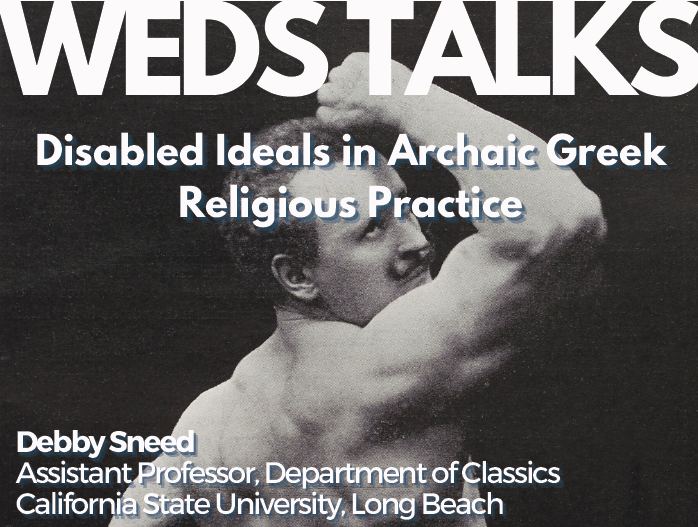
ABSTRACT: Religious practice on the Athenian Acropolis in the Archaic period is perhaps best known through the dedications that were buried on the summit after the site was sacked by the Persians in the early 5th century BCE. These dedications include marble statues of young maidens—called korai—as well as inscribed statue bases that record the names of dedicators and, sometimes, their motivations. In this paper, Debby Sneed presents the results of her co-authored study on one religious dedication and discusses what it means for our understanding of religious devotion and disability in Archaic Athens.
BIO: Debby is a UCLA alumna; she graduated with her PhD in Archaeology in 2018. Currently she is an assistant professor of Classics at California State University, Long Beach. She also serves as the Field Supervisor of the Athenian Agora excavations and summer program for the American School of Classical Studies at Athens. Her research primarily focuses on disability in ancient Greece. She has published three articles so far on the topic, including one on disability and infanticide in ancient Greece, another on ramps as accessibility features in ancient Greek healing sanctuaries, and one entitled Ancient Greek and Roman Crip Lit. She has an article forthcoming that is co-authored with Mason Shrader, a graduate student at the Joukowsky Institute for Archaeology in the Ancient World, which argues for the ethics of accessibility on archaeological excavations. In today's talk, she will present an article co-authored with Erin Lawrence-Roseman, a graduate student at Berkeley, that will be published in Art Bulletin later this year, focused on disability and ancient Greek sculpture.
Contact Sumiji Takahashi
Email sutakahashi@ioa.ucla.edu
Phone 310-825-4169
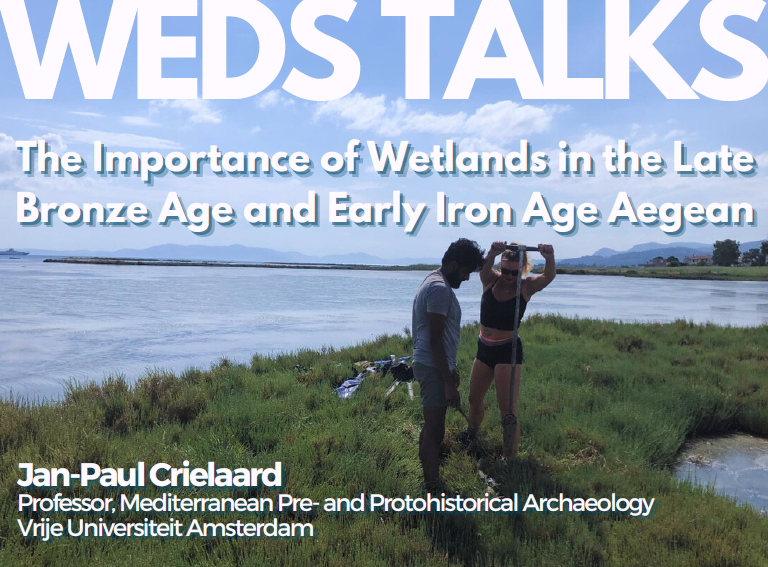
ABSTRACT: During the final stages of the Late Bronze Age, a shift in habitation towards coastal locations can be observed in several regions within the Aegean. Palaeoclimatic, sedimentological, and palynological data show that this shift includes settlement in or near marshy areas and wetlands. An assessment is made of the living conditions, as well as the advantages and disadvantages of inhabiting watery landscapes, using (bio)archaeological data and references from the Homeric epics. These findings help to shed new light on specific specimens of Late Geometric pottery, which appear to feature examples of wetland iconography.
BIO: Jan Paul Crielaard research focuses on the Early Iron Age and Archaic period, often combining written and archaeological information. He has published extensively on such topics as interconnections and culture contacts within the Mediterranean, Greek colonization, elites and elite behaviour, ethnicity, and archaeology and the Homeric epics. He has been involved in fieldwork in Greece, Cyprus, Turkey and Italy, and has been the co-director of the L’Amastuola field project in Puglia, Italy, and since 2010 directs the Plakari Archaeological Project in Karystos, and the Southern Euboia Sea and Land Routes Projects, both on the island of Euboia, Greece.
Contact Sumiji Takahashi
Email sutakahashi@ioa.ucla.edu
Phone 310-825-4169
- 1 of 21
- next ›



